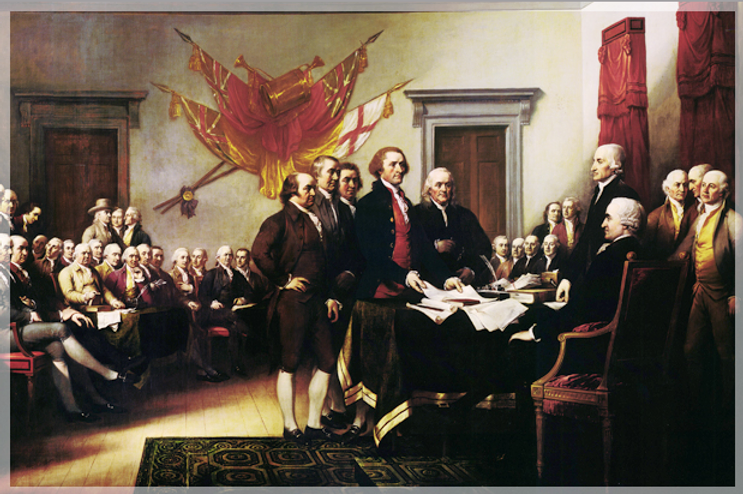
As a citizen of the United States of America, we celebrate Independence Day on July 4th. We celebrate this holiday to remember the signing of the Declaration of Independence in 1776, which declared the 13 united colonies free from the King of Great Britain.
However, most Americans don’t understand what it truly meant for our founding fathers to sign that document which costed them their lives, fortunes and sacred honor. It’s important to remind ourselves what our founding fathers were feeling and what they were willing to sacrifice in order to be free.
Signing the Declaration of Independence
On July 1, 1776, the Second Continental Congress met in Philadelphia, and on the following day 12 of the 13 colonies voted in favor of Richard Henry Lee’s motion for independence. The delegates then spent the next two days debating and revising the language of a statement drafted by Thomas Jefferson. On July 4, Congress officially adopted the Declaration of Independence, and as a result the date is celebrated as Independence Day. New York’s delegates didn’t officially give their support until July 9 because their home assembly hadn’t yet authorized them to vote in favor of independence. It took two weeks for the Declaration to be written on parchment in a clear hand. Most of the delegates signed on August 2, but several signed on a later date. The signed parchment copy now resides at the National Archives in the Rotunda for the Charters of Freedom, alongside the Constitution and the Bill of Rights.
What did signing the Declaration mean
Benjamin Rush wrote a letter to John Adams, where he described what happened in Liberty Hall on that day.
“..When we came in, many believed it would be our death warrant. No one said a word when they were called forward (to sign the Declaration of Independence)…” – Benjamin Rush
No one said a word, until Elbridge Gerry was called to sign. For this story all you need to know is Elbridge was the smallest in the room. As he was walking up, Col. Benjamin Harrison (who was probably the tallest of the founders) broke the silence of the room during the most historical event in our nation by saying to Elbridge,
“I shall have a great advantage over you Mr. Gerry, when we’re hung by what we’re now doing. By the size and great weight of my body, well I’ll be dead in a minute or two. But by the lightness of yours, you’re going to dance in the air for an hour or more before you’re finally dead.”
– Col. Benjamin Harrison
Benjamin Franklin said at the end of the signing,
“We better all hang together, or we shall surely hang separately.” – Benjamin Franklin
Our Founders knew by signing their name, they were signing their death warrant. Reading the last sentence in the Declaration of Independence helps us capture to the full extent what they were sacrificing.
“And for the support of this Declaration, with a firm reliance of the protection of divine Providence, we mutually pledge to each other our Lives, our Fortunes and our sacred Honor.”
– Declaration of Independence
What the signers gave for our freedom:
7 lost their lives
2 lost their health
5 were POW’s
17 lost their estates or fortunes
5 incurred heavy debt
4 lost their children
4 lost their wives(1)
A story you maybe didn’t know
A few months later, September of 1776, Gen. Washington lost several key battles and was pushed back to Manhattan. He needed a spy to try and figure out where the British were moving next. Back then, spy’s were looked down upon and viewed as untrustworthy. You were the lowest of the low in the military. There was no honor being killed as a spy. Washington requested within one of his generals to volunteer for the job. Col. Thomas Knowlton (who was talking to the equivalent of our army rangers today) explained to his special forces officers why the General needs someone to step up. No one was willing.
As Col. Knowlton turns to leave, a young man who arrived at the meeting late because he was ill steps forward and says “I will undertake the mission!“.
Capt. Nathan Hale was only 21 years old, graduated form Yale with first class honors at 18 years old in 1773 to become a teacher. After Lexington and Concord break out Hale shows up at the town hall meeting in his community at 19 years old to tell his community “We should take up arms, we should march immediately and not lay down our arms until we achieve independence.” Hale left the town hall and joined a Connecticut militia and was elected first lieutenant within five months.
After Nathan Hale volunteers for the dangerous mission, his fellow colleague and soldiers tried to talk him out of it saying, “You are to honest to be a spy, it’s an impossible mission and even if you succeed there is no honor in it.” Hale responded saying, “There is honor in any mission necessary for the cause of freedom. I will do my duty!“
Unfortunately, after mapping out the British movements and stuffing his writings in his socks, he is captured heading back across enemy lines where evidence is clear he is a spy. He was set to hang the next day. Before his hanging he was given the ability to speak, where different writings explained was long and heartfelt. As the British heckled him explaining that he is throwing his life away for a cause that would not succeed. The amazing response that Hale gave was,
“I only regret that I have but one life to give for my country.”
He accomplished more in that moment, then all the intelligence he gathered as those words spread throughout the colonial armies.
Evergreen Takeaway
This July 4, as we celebrate Independence Day lets reflect on the amazing sacrifice and patriotism our founding fathers showcased to the world what freedom looks like. Let us live our lives enjoying the freedom that we have which was won by so much sacrifice.
(1) – wallbuilders.com
Evergreen Wealth Management, LLC is a registered investment adviser. Information presented is for educational purposes only and does not intend to make an offer or solicitation for the sale or purchase of any specific securities, investments, or investment strategies. Investments involve risk and unless otherwise stated, are not guaranteed. Be sure to first consult with a qualified financial adviser and/or tax professional before implementing any strategy discussed herein. Past performance is not indicative of future performance.
